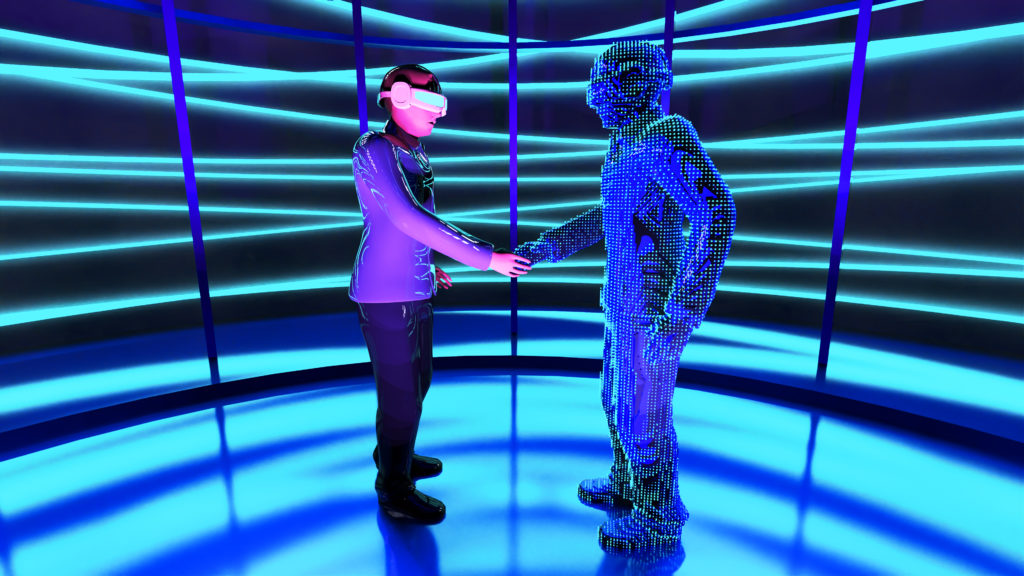São Paulo – The business world as it is known will change. New opportunities will open up, new negotiation fronts, a new family of hardware may be needed soon, and people will be able to be almost physically here, there, or anywhere. The metaverse will enter people’s lives, who will also enter the metaverse.

By proposing a mixture of actual presence in the virtual world, putting the social network inside a computer game, living in a non-physical environment, the metaverse opens up opportunities for interaction. For example, if a business meeting would take place in Shanghai, China, the Brazilian participants in Rio de Janeiro would be represented by their holograms, which is the actual projection of their image in a meeting room as if they were there.
“The metaverse changes the matter of space, the use of information and space. It will provide more significant contact between people, even from a distance, and new ways of presenting a product with new interactions. Space relations will change,” says professor and researcher of games and virtual environments Francisco Tupy.
For that to happen, says the researcher, making smartphones and computers more powerful may be necessary. Augmented reality projectors and glasses, as well as 5G internet, will be essential. A world of opportunities could emerge from this.

One of the best-known references to the metaverse is Second Life, a game released in 2003. What it proposed was the interaction of real people inside computers. All participants could create characters with their physical features, called avatars, and interact with other users. “In Brazil, Second Life even made some specific advertisements, but in the United States, its reach was much more significant. I could attend classes at major universities, study languages,” recalls Tupy.
Today, big fashion brands, for example, are already creating products to be sold exclusively in games, using the concept of the metaverse in new forms of advertising promotion, brand experience, and marketing.
The origin
Metaverse was a term first used in 1992 in Neal Stephenson’s science fiction book Snow Crash. However, the concept we have today is more recent and can have different interpretations. Liliah Angelini, account manager, and trend specialist at WGSN, a trailblazing company in consumer trends and behaviors, says the company identified the metaverse in 2018.
“The internet is turning into the metaverse, and what is it? A shared digital space that will influence culture and design, enabling new forms of expression and experiences. The metaverse will be the support platform for all our future interactions – both online and offline,” Liliah told ANBA in an email interview.

She also draws attention to the fact that, as it is still “emerging,” there is still no universal definition of what the metaverse is. Some characteristics, however, identify the concept: being a live experience in real-time; hosting any audience size; having a fully functioning economy; spanning across all platforms as well as physical and digital domains; allowing digital assets to transit across platforms, and containing experiences and content created by individual users and large corporations.
The big corporations are leading this change. In late October, Facebook announced its new company name: Meta. The social networks Facebook, Instagram, and the WhatsApp instant messaging application will continue to exist and operate within this company. But the company’s new name also represented, in the view of its CEO and founder, Mark Zuckerberg, a further step towards the future, which is precisely the metaverse.
Meta has a vision and foresees a practical application for the concept, which can vary between companies. All the so-called big techs, however, have their metaverse-based projects underway. And not just them. “It is also the ripe time for small companies, startups, or someone to have a unique idea and become a giant. This is a gold rush opening up,” says Tupy.
When will the metaverse be among us? In some ways, it has been with Second Life and also games like Fortnite, Roblox, and Minecraft. They are not, according to Liliah, “the metaverse itself.” “But they are destinations within it.”
To the universe and beyond
The word metaverse is formed by meta, from the Greek “beyond,” and verse, in reference to “universe.” Does it seem like an exaggeration? Carolina Christofoletti, a lawyer specializing in cyberlaw, Master’s student in Cyber Crimes at the Higher Polytechnic School of the University of Nebrija, Spain, and Master’s student in Compliance at the Law School of the University of Castilla La Mancha, also in Spain; defines the metaverse as “more” than everything we know.
“The metaverse is more than cryptocurrency trade, more than social media, more than smart contracts, and more than virtual reality: it is a place where all of this meets, and where the new buttons and features will be perpetually and constantly expanding. Ultimately, the metaverse accepts everything,” she says. Cryptocurrencies are currencies traded virtually but with “real” values that can exceed tens of thousands of dollars.
In business
And in what other ways will the metaverse impact the business world? Carolina mentions an example: Imagine, when looking for a typical Arab product on Google, the buyer could click a button, “open the virtual doors of the metaverse,” travel to an Arab country, and contact the artisan who made the product.

“The business experience is, in the metaverse, raised to the limit to, finally, be rebuilt again. Beyond physical borders, it is a place where “the Arab world,” as a cultural environment, can finally exist – and more also be accessible to a worldwide audience,” says Carolina.
In another example of the evolution of trade, Tupy cites tourism. “The possibilities of the metaverse will not supplant tourism itself but could enable a person who does not have the money to travel to an Arab country, for example, to visit and get to know that country through virtual interaction and even be impacted by an advertisement during the trip. Those who have the resources, on the other hand, could be impacted in the metaverse environment and travel and consume at the physical destination as well,” exemplifies Tupy.
“It is essential to mention new forms of advertising will develop as the metaverse evolves within this context. Brands need to explore this space, not only thinking about brand awareness and becoming known to consumers through entertainment but also considering focusing on what else can be offered to them,” adds Liliah.
* Special report by Marcos Carrieri for ANBA
Translated by Elúsio Brasileiro




